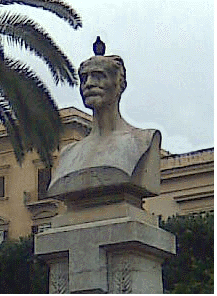...Best of Sicily presents... Best of Sicily Magazine. ... Dedicated to Sicilian art, culture, history, people, places and all things Sicilian. |
by Vincenzo Salerno | ||
Magazine Index Best of Sicily Arts & Culture Fashion Food & Wine History & Society About Us Travel Faqs Contact Map of Sicily |
Writing late in the nineteenth century, Pitré was one of the few Sicilians of his era to compile dictionaries of Sicilian words, translate these into Italian and then compose a guide to grammar. This was a daunting task given the language's numerous regional forms within Sicily (Agrigentan, Palermitan and Messinese are quite distinct in many ways) and its evolution from the more poetic medieval form loved by Dante and Boccaccio. Modern Sicilian is a guttural, even vulgar-sounding, tongue bearing little resemblance to the melifluous "Old" Sicilian of Ciullo d'Alcamo heard at the court of Frederick II and exemplified by the "Sicilian School" of poetry. Pitré also collected folk tales and proverbs, two areas overlooked by what, until that time, was Sicily's predominantly aristocratic literary culture. Sadly, few in Pitré's favourite social class (the rustic proletariat) could read what he wrote, so high was their rate of illiteracy, but the master didn't allow this to dissuade him. It is Pitré's glorification of the Mafia that critical readers found offensive even a century ago. Who, indeed, was Giuseppe Pitré? He was born in Palermo in 1841 (and died there in 1916). Ever the idealist, Pitré claimed to be a volunteer in Garibaldi's "Thousand" in 1860 --which would number many more if everybody who claimed to be part of the invading forces actually participated. In 1866, amidst the Palermitans' revolts against the Piedmontese "unification" forces, Pitré received a degree in medicine from the University of Palermo. His profession brought him into contact with various segments of society, feeding his natural curiosity about folklore and the largely-illiterate "popular" classes of Palermo, effectively about eighty percent of the population in those times. He published extensively, and founded an ethnographic museum reflecting his interests. One might, if guardedly, refer to Giuseppe Pitré as an anthropologist, and he was finally recognised as such with a teaching position in 1910. In the century since his death, Pitré has been acknowledged as somebody who greatly contributed to our knowledge of the folk customs of a largely illiterate class which would not have preserved this information on its own. His advocacy of the Risorgimento, Italy's unification movement, has proven less enduring; in 1946 the House of Savoy was removed following its support of Fascism, the achievements of the Bourbons now enjoy greater recognition, the principles of the Risorgimento were called into question in view of sluggish social process in Sicily, and Italy's new federalism now recognises regional economies and cultures. About the Author: Palermo native Vincenzo Salerno has written biographies of several famous Sicilians, including Frederick II and Giuseppe di Lampedusa. | |
Top of Page |
 If one individual could be said to epitomise Sicily's
perennial "age of mediocrity" it would be the so-called "scholar" Giuseppe
Pitré, a dilettante who exalted the Mafia, folk culture and the modern dialect of Sicily
(actually a language in its own right). This cynicism isn't meant to suggest that his work was
entirely without merit, or that the writings of the venerable Pitré should be ignored altogether,
but there isn't much to commend it. Before launching into a heavy-handed critique, let's consider Pitré's
legitimate contributions to our knowledge of the Sicilian language and folk culture.
If one individual could be said to epitomise Sicily's
perennial "age of mediocrity" it would be the so-called "scholar" Giuseppe
Pitré, a dilettante who exalted the Mafia, folk culture and the modern dialect of Sicily
(actually a language in its own right). This cynicism isn't meant to suggest that his work was
entirely without merit, or that the writings of the venerable Pitré should be ignored altogether,
but there isn't much to commend it. Before launching into a heavy-handed critique, let's consider Pitré's
legitimate contributions to our knowledge of the Sicilian language and folk culture.